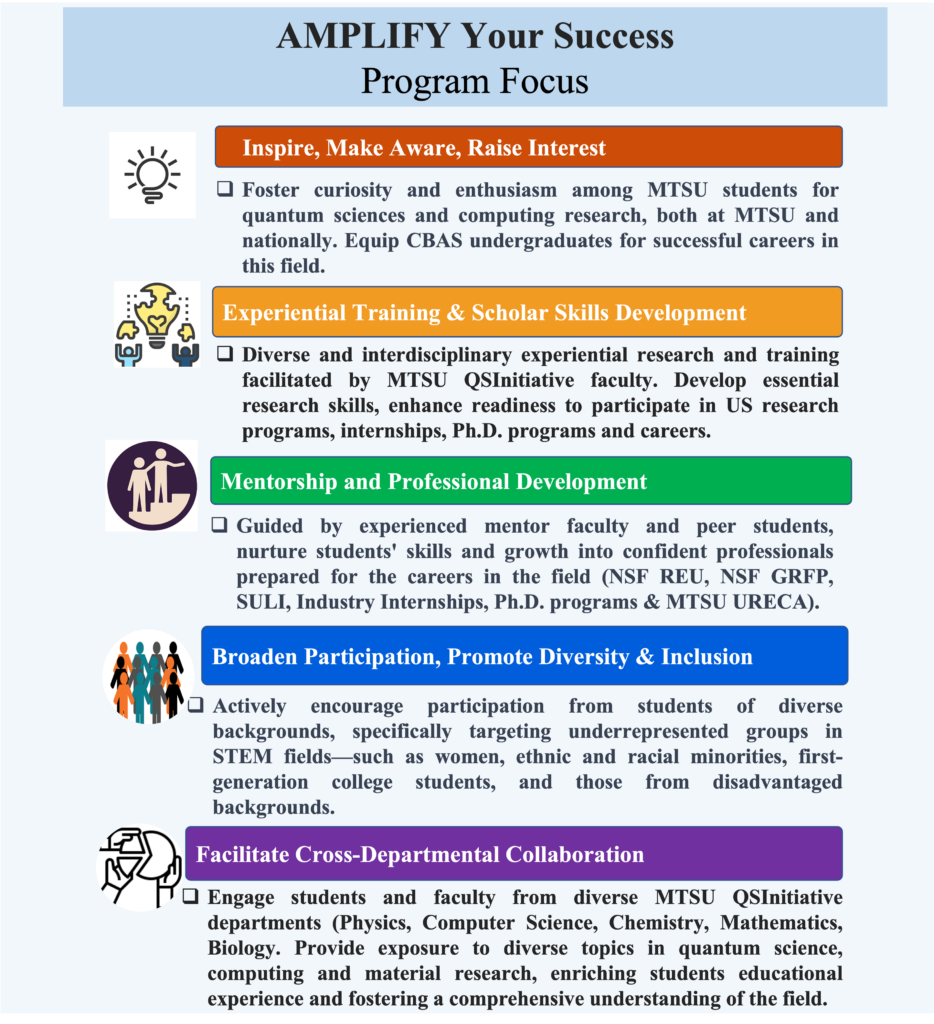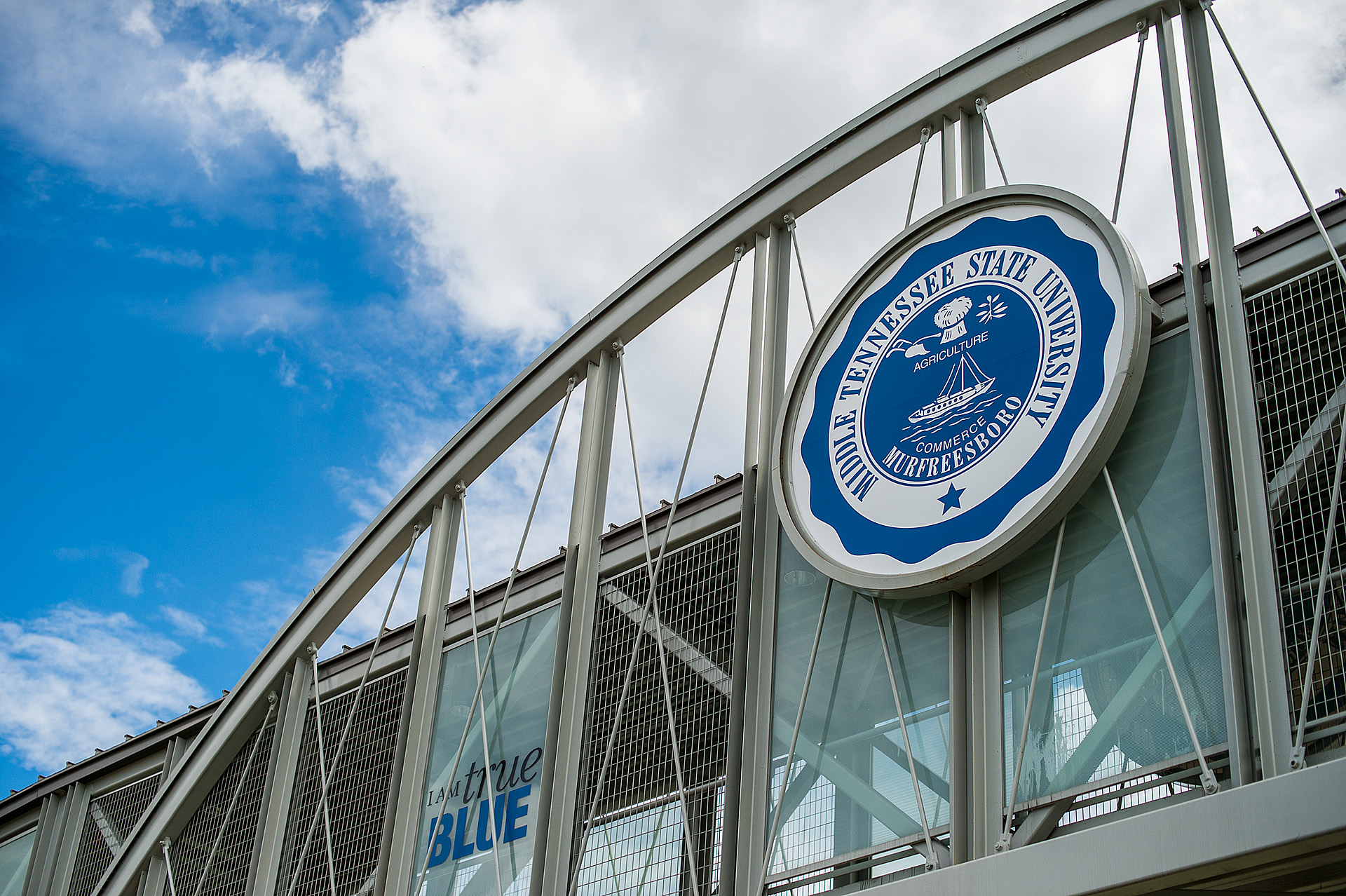Quantum Science Initiative
Amplify

AMPLIFY Interdisciplinary Scholarship Program, housed within MTSU CBAS QSInitiative, is designed for undergraduate STEM students interested in the fields of quantum/computation/material sciences/modeling/education across various CBAS departments: physics, astronomy, chemistry, computer science, mathematics, biology, engineering. Addressing the growing national demand for the expertise and the workforce development in these areas of CBAS sciences, this program offers hands-on research, career exposure, comprehensive mentorship, and professional development, aiming to enhance student success while reducing barriers in these emerging fields. We aspire to cultivate an interdisciplinary MTSU scholar community, fostering inclusivity, diversity, and representation in the rapidly evolving realms of quantum, computation, and materials science. This is a 24-week program spanning Fall ’23 through Spring ’24. AMPLIFY Program.
The current stipend for each AMPLIFY Scholar is $2500.
To apply for the program, please submit a personal statement via the Registration portal: AMPLIFY REGISTRATION LINK
AMPLIFY Program Details:

Amplify trainees will meet weekly/biweekly for 1 hour meetings/professional development trainings and work on their research with the matched faculty mentor based on interests of the trainee. Over the Fall ’23-Spring ’24, all trainees will develop a set of interdisciplinary research skills through faculty-mentored research experiences, faculty workshops, weekly professional development sessions, and specialized mentoring workshops that expose the trainees to interdisciplinary research approaches. Qualified trainees will be trained to apply to the national (NSF REU, NSF GRFP, SULI , Ph.D. ) and internal (MTSU URECA) training programs in Q-C-M fields. In Spring 2024 students will present their research at MTSU Scholar Week.
The AMPLIFY program will support students by providing the following:
- Financial support;
- Hands-on experiential research training;
- Academic and mentoring support through faculty and peer mentoring;
- Preparation for the national scholarships in research (NSF REU, NSF GRFP, SULI), internships and/or graduate schools.
- Weekly group meetings and journal clubs to develop community among students, build research and academic portfolios; develop scientific presentation skills;
- Annual conferences and scholar’s day activities;
- Guest speakers , workshops and focus on topics such as NSF REU/GRFP/MTSU URECA Scholarships, grad school applications, time management, study skills, internship and research opportunities, etc;
- Opportunity to make an impact on students and faculty at MTSU in CBAS computation/materials/quantum/modeling/experimental research.
Eligibility of applicants
- Pursuing a program of study that falls within the College of Basic and Applied Sciences
- Have a GPA of 3.0 or greater
- Have a genuine interest in pursuing careers in any of these areas of sciences: quantum/computation/astronomy/material sciences/modeling/education in the fields of physics, astronomy, chemistry, biology, computer science, mathematics, engineering
- The program is committed to promoting diversity and enhance participation in STEM, welcoming all eligible students. Applicants from traditionally underrepresented backgrounds in STEM, including but not limited to women, specific race/ethnicity’s, individuals from low-income families, or first-generation college students, are strongly encouraged to apply.
- Able to commit 1 hr/week participating in AMPLIFY program meetings/workshops
Application process and important dates:
Application deadline: September 15 (11:59 pm), 2023
Notification of selection by September 29 , 2023
Tentative program dates: October 2nd, 2023– March 30, 2024
To apply for the program, please submit a Personal Statement via the Registration portal (follow the link above):
As part of the application, please be prepared to have the following information:
- One paragraph summary of your background and how you became interested in STEM.
- One paragraph summary of your educational training and research experience skills (e.g., computational, lab experience, data analysis).
- One paragraph to describe your career goals and aspirations.
- A unofficial transcript that can be uploaded (Use PipelineMT > Select Registration & Student Records > Transcript icon).
Research areas to choose from (the preliminary list):
- Computational Physics and Chemistry: quantum physics and chemistry (Hanna Terletska, Preston MacDougall, Jing Kong), photonics & quantum optics ( Neda Naseri), strongly-correlated systems (Terletska, Jing Kong), disorder (Hanna Terletska), picotechnology (Preston MacDougall)
- Computational and Mathematical Biology: Joshua Phillips, Wandi Ding
- Plasma: Neda Naseri
- Material research: Mengliang “Mike” Zhang (nanomaterials), Suman Neupane (nanomaterials), Greg Van Patten (nanomaterials), Andrienne Friedli (X-ray, optically tunable liquid crystals and organic magnetic materials), Emmanuel Rowe (ceramics)
- Machine Learning: Joshua Phillips, Abdul Khaliq
- Educational research: TBA
- Modeling and simulations: TBA
Q-C-M AMPLIFY PROGRAM COMMITTEE: Hanna Terletska (Physics), Neda Naseri (Physics), Joshua Phillips (Computer Science), Mengliang Zhang (Chemistry), Wandi Ding (Mathematics), Abdul Khaliq (Mathematics), Jing Kong (Chemistry).
Fall 23-Sp24 Coordinators: Hanna Terletska, Neda Naseri, Wandi Ding

